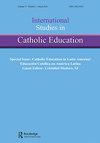Editorial
IF 0.2
0 RELIGION
引用次数: 0
Abstract
In this edition, the second of my editorship, I am once again privileged to report that we are publishing articles from researchers across five continents: Africa, Asia, Australia, North America and Europe, representing seven countries. Taking into account the book reviews appraising scholarship from Australia, England and Ireland, the Editorial Board continues to maintain the global reach of the journal. From India, Mukti Clarence, a Jesuit priest belonging to the South Indian conference, has co-authored an article with P.D. Viju, a Catholic priest belonging to The Carmelites of Mary Immaculate (CMI) Congregation, and Tony Sam George, the Dean of Humanities and Sciences, and the Head of the Department of Psychology, Christ University, Bangalore. They have written a thought-provoking article exploring the extent to which the Jesuit education vision is being maintained in challenging circumstances in rural Chotanagpur, India, in a contemporary context, in contrast to the situation in the pre-independence era. The phrases ‘affective commitment’ and ‘psychological wellbeing’ are particularly pertinent in relation to teachers. These are regarded as central to the project of recovering the fundamental principles for the Jesuit educational mission, reflecting similar situations across Catholic education worldwide and most certainly in a UK context. A second religious order, the Comboni missionaries, features prominently in the second article by Jorge Carlos Naranjo Alcaide exploring the identity and quality of Catholic schools in Sudan currently. After a historical conspectus of the contribution and impact of the Comboni missionaries in Sudan and in order parts of Africa, focusing especially on the founder of the order, the article goes on to investigate contemporary challenges, once again in a post-independence context. The exploration of the broadening of the concept of evangelisation in a post-Vatican II context, encapsulated in the iconic Apostolic Exhortation of Pope Paul VI Evangelii Nuntiandi (1975) leads Alcaide to conclude that ‘Catholic Schools have shown special care for the cultural, religious and ethnic diversity of their staff and students based on the respect for the personal freedom and the infinite dignity of every human person’. In my view, this constitutes a significant achievement in a context in which Catholics represent just 1% of the population and reflects the central tenets of the Congregation for Catholic Education’s 2017 document Educating to Fraternal Humanism. The third article, authored by Timothy Cook, Ronald Fussell and Thomas Simonds SJ, all colleagues at the University of Creighton USA, examines comprehensively the imperative to avert a crisis in the context of the turnover and retention of Catholic School Superintendents in the USA. In explaining the contrasting roles of Catholic and public-school superintendents, the authors refer to research that reveals a significant correlation between the effectiveness of superintendents in Catholic schools and academic achievement, thereby suggesting at the outset that编辑
在我担任编辑的第二期中,我再次荣幸地报告,我们正在发表来自五大洲研究人员的文章:非洲、亚洲、澳大利亚、北美和欧洲,代表七个国家。考虑到评估澳大利亚、英格兰和爱尔兰奖学金的书评,编辑委员会继续保持该杂志的全球影响力。来自印度的南印度会议耶稣会牧师Mukti Clarence与圣母无原罪会天主教牧师P.D.Viju以及班加罗尔基督大学人文与科学学院院长兼心理学系主任Tony Sam George合著了一篇文章。他们写了一篇发人深省的文章,探讨了在当代背景下,与独立前的情况相比,耶稣会教育愿景在印度Chotanagpur农村充满挑战的环境中得以保持的程度。“情感承诺”和“心理健康”这两个短语与教师尤其相关。这些被视为恢复耶稣会教育使命基本原则项目的核心,反映了世界各地天主教教育的类似情况,尤其是在英国。Jorge Carlos Naranjo Alcaide在第二篇文章中重点介绍了第二个宗教教团Comboni传教士,该文章探讨了目前苏丹天主教学校的身份和质量。在对康博尼传教士在苏丹和非洲秩序部分地区的贡献和影响进行了历史概述之后,特别关注秩序的创始人,文章再次在独立后的背景下探讨了当代的挑战。在后梵蒂冈二世的背景下,对福音传福音概念的扩展进行了探索,这体现在教皇保罗六世的标志性使徒训诫——伊万杰利·努蒂安迪(1975)中,这让阿尔塞德得出结论,“天主教学校对文化、,在尊重每个人的个人自由和无限尊严的基础上,教职工和学生的宗教和种族多样性”。在我看来,在天主教徒仅占人口1%的背景下,这是一项重大成就,反映了天主教教育公理会2017年文件《向兄弟人道主义教育》的核心原则。第三篇文章由美国克雷顿大学的Timothy Cook、Ronald Fussell和Thomas Simonds SJ等同事撰写,全面探讨了在美国天主教学校督学更替和留任的背景下避免危机的必要性,作者引用了一项研究,该研究揭示了天主教学校督学的有效性与学业成绩之间的显著相关性,从而在一开始就表明
本文章由计算机程序翻译,如有差异,请以英文原文为准。
求助全文
约1分钟内获得全文
求助全文

 求助内容:
求助内容: 应助结果提醒方式:
应助结果提醒方式:


